48 results
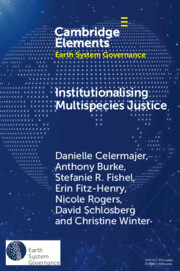
Institutionalising Multispecies Justice
-
- Published online:
- 29 January 2025
- Print publication:
- 27 February 2025
-
- Element
-
- You have access
- Open access
- HTML
- Export citation
Food Consumption, Eco-civilization and Environmental Authoritarianism in China
-
- Journal:
- The China Quarterly , First View
- Published online by Cambridge University Press:
- 06 December 2024, pp. 1-16
-
- Article
-
- You have access
- Open access
- HTML
- Export citation
Legal pluralism, ideology, and institutional change: the evolution of institutions for coastal resource governance in Ghana
-
- Journal:
- Journal of Institutional Economics / Volume 20 / 2024
- Published online by Cambridge University Press:
- 19 September 2024, e32
-
- Article
-
- You have access
- HTML
- Export citation
On the edges of extinction: Indigenous whaling governance, the 1977 “bowhead controversy” and its legacy
-
- Journal:
- Cambridge Prisms: Extinction / Volume 2 / 2024
- Published online by Cambridge University Press:
- 09 September 2024, e10
-
- Article
-
- You have access
- Open access
- HTML
- Export citation
Curbing Elite Capture or Enhancing Resources: Recentralizing Local Environmental Enforcement in China
-
- Journal:
- The China Quarterly , First View
- Published online by Cambridge University Press:
- 03 June 2024, pp. 1-20
-
- Article
-
- You have access
- Open access
- HTML
- Export citation
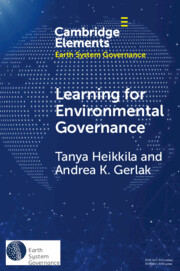
Learning for Environmental Governance
- Insights for a More Adaptive Future
-
- Published online:
- 22 April 2024
- Print publication:
- 16 May 2024
-
- Element
- Export citation
The Intersections of Public Rights and Private Rules: An Analysis of Human Rights in Forestry and Fisheries Certification Standards
-
- Journal:
- Transnational Environmental Law / Volume 13 / Issue 1 / March 2024
- Published online by Cambridge University Press:
- 11 March 2024, pp. 190-222
-
- Article
-
- You have access
- Open access
- HTML
- Export citation
Herbicide-resistance management: a common pool resource problem?
-
- Journal:
- Weed Science / Volume 72 / Issue 2 / March 2024
- Published online by Cambridge University Press:
- 20 February 2024, pp. 117-124
-
- Article
-
- You have access
- Open access
- HTML
- Export citation
Rights of Nature on the Island of Ireland: Origins, Drivers, and Implications for Future Rights of Nature Movements
-
- Journal:
- Transnational Environmental Law / Volume 13 / Issue 1 / March 2024
- Published online by Cambridge University Press:
- 18 January 2024, pp. 35-60
-
- Article
-
- You have access
- Open access
- HTML
- Export citation
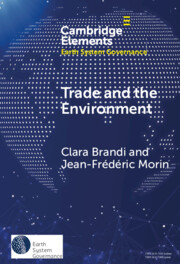
Trade and the Environment
- Drivers and Effects of Environmental Provisions in Trade Agreements
-
- Published online:
- 07 December 2023
- Print publication:
- 21 December 2023
-
- Element
-
- You have access
- Open access
- HTML
- Export citation
Financialized savings in public water governance: An illustrative case study in the arid American West
-
- Journal:
- Finance and Society / Volume 7 / Issue 2 / 2021
- Published online by Cambridge University Press:
- 09 November 2023, pp. 94-112
-
- Article
-
- You have access
- Open access
- Export citation
Liberal Environmentalism: The Public-Private Production of European Emissions Standards
-
- Journal:
- Business History Review / Volume 97 / Issue 3 / Autumn 2023
- Published online by Cambridge University Press:
- 06 June 2023, pp. 575-601
- Print publication:
- Autumn 2023
-
- Article
-
- You have access
- Open access
- HTML
- Export citation
13 - Democratic Representation, Environmental Justice and Future People
- from Part III - Perspectives
-
-
- Book:
- Representations and Rights of the Environment
- Published online:
- 16 March 2023
- Print publication:
- 06 April 2023, pp 310-333
-
- Chapter
- Export citation
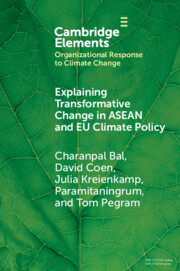
Explaining Transformative Change in ASEAN and EU Climate Policy
- Multilevel Problems, Policies and Politics
-
- Published online:
- 03 April 2023
- Print publication:
- 13 April 2023
-
- Element
-
- You have access
- Open access
- HTML
- Export citation
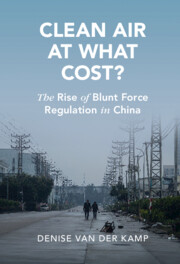
Clean Air at What Cost?
- The Rise of Blunt Force Regulation in China
-
- Published online:
- 28 January 2023
- Print publication:
- 19 January 2023
Chapter 3 - Why Blunt Force Regulation?
-
- Book:
- Clean Air at What Cost?
- Published online:
- 28 January 2023
- Print publication:
- 19 January 2023, pp 49-63
-
- Chapter
- Export citation
Chapter 1 - Introduction
-
- Book:
- Clean Air at What Cost?
- Published online:
- 28 January 2023
- Print publication:
- 19 January 2023, pp 1-27
-
- Chapter
- Export citation
Interspecies politics and the global rat: Ecology, extermination, experiment
-
- Journal:
- Review of International Studies / Volume 49 / Issue 2 / April 2023
- Published online by Cambridge University Press:
- 06 May 2022, pp. 241-257
- Print publication:
- April 2023
-
- Article
- Export citation
6 - Cognitive Evolution and the Social Construction of Complexity
-
-
- Book:
- Theorizing World Orders
- Published online:
- 18 November 2021
- Print publication:
- 25 November 2021, pp 134-168
-
- Chapter
- Export citation
A scoping review of environmental governance challenges in southern Africa from 2010 to 2020
-
- Journal:
- Environmental Conservation / Volume 48 / Issue 4 / December 2021
- Published online by Cambridge University Press:
- 19 October 2021, pp. 235-243
-
- Article
-
- You have access
- Open access
- HTML
- Export citation

